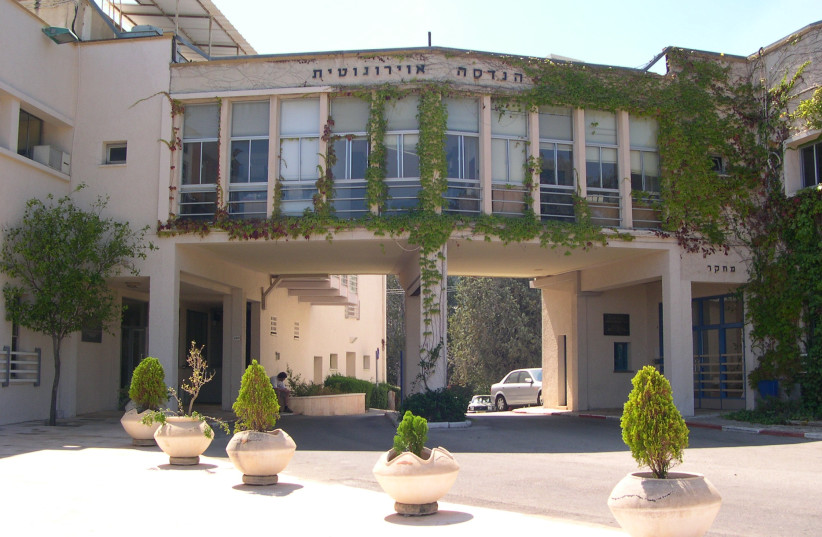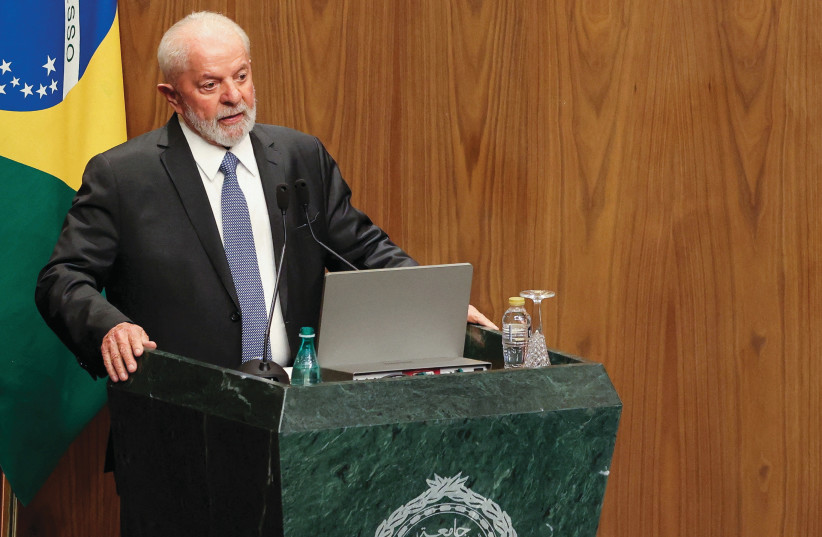With International Women’s Day on the horizon, it is natural for media outlets to highlight individual women and women’s organizations.
Among the best-known Jewish women’s organizations is Hadassah, the Women’s Organization of America, which has just launched a global campaign under the title “End the Silence.”
One could say better late than never, considering that Jewish organizations have also been relatively silent about the violence and sexual abuse to which Israeli women hostages have been subjected in Gaza.
But now that an official investigative report has been published and the United Nations female affiliates have been castigated, it is a safe bet to say that not only Jewish women’s organizations but also women’s organizations worldwide will make vocal condemnations of sexual abuse and all forms of violence against women a top priority.
Hadassah, as the largest women’s organization in the US, is leading the field in a campaign to unite people around the world to speak out against the weaponization of sexual violence by Hamas and other organizations in different countries against women of all creeds, races, nationalities, and political beliefs.
“As leaders of a humanitarian organization, we at Hadassah are shaken to the core by the horrific evidence of how Hamas used rape and other acts of brutal sexual violence during its October 7 attack on Israel. And we are outraged that these war crimes have been ‘justified,’ denied, and even celebrated by some,” said Hadassah National President Carol Ann Schwartz.
“Rape should never be sanctioned as an act of war,” she added. “That is why we are bringing together Hadassah’s hundreds of thousands of passionate volunteers and leaders from across the world – to end the silence, to speak out, to raise awareness, and, critically, to demand justice.”
Whether it was an op-ed in Newsweek by Michal Herzog or reported testimony by victims of Hamas sexual violence that has helped to increase universal awareness is debatable. But what is immoral and unforgivable is the international community’s silence in the face of irrefutable evidence of Hamas’s savage war crimes and the apparent legitimization of rape as a weapon of war.
Hadassah’s “End the Silence” campaign will focus on the gruesome reality that Hamas planned and systematically carried out acts of sexual violence against women and girls in Israel.
The campaign will ensure that people everywhere not only hear the truth but also have the facts they need to counter misinformation, including attempts to justify these actions or deny they happened.
The campaign is mobilizing grassroots leaders in 14 countries to demand that United Nations Secretary-General António Guterres advance an unbiased, independent, and thorough UN investigation and pursue vigorous prosecution of Hamas for these war crimes.
Hadassah will post videos and calls to action on the ‘End the Silence’ website and social media. Hadassah’s more than 800 chapters across the US will join the organization’s leaders around the world in taking up the challenge in their communities by organizing events, rallies, and other advocacy activities.
While this campaign has been launched as an outcome of the brutality by Hamas against Israeli women and girls, its message applies to women everywhere. Many of the female African asylum seekers who found their way to Israel have also spoken of being raped and beaten, and women in Muslim-majority countries have been the victims of so-called honor killings as well as rape and other forms of violence.
This deprivation of human rights can apply to women anywhere and everywhere, and it must be stopped.
First female dean of Technion faculty makes history
■ THE BEST way to start the new year is by making history. This is what Professor Daniella Raveh did on January 1, when she took up her position as the first female dean of the Technion Faculty of Aerospace Engineering. An alumna of the faculty, she graduated with honors and went on to earn both a master’s and Ph.D. degrees there. Raveh subsequently became a prominent researcher in aeroelasticity and a popular lecturer as a member of the faculty.

Raveh’s research field, aeroelasticity, concerns the interaction of aerodynamic forces and flexible structures. Today, as lighter and more flexible aircraft are being designed globally, a thorough study of aeroelastic phenomena is essential to understanding their flight performance. Raveh’s team researches high-fidelity models for aeroelastic analysis and conducts wind tunnel and flight tests to explore all aspects of this field.
As dean, Raveh is responsible for implementing the faculty’s academic program, fostering interdisciplinary collaboration and research, and upholding high standards of research and teaching. She is committed to enhancing the faculty’s reputation and accomplishments. Her perspective as an alumna is advantageous for the faculty’s continuous endeavor to offer students and researchers an optimal environment for their studies and research.
In congratulating Raveh, Technion President Professor Uri Sivan noted, “The Faculty of Aerospace Engineering was the first faculty to have been built on the new Technion campus in Neve Shaanan, and it is the only one in Israel that trains engineers in this field.
During the last few decades, Technion has undergone a transformation. The percentage of female undergraduate students is constantly growing and now stands at around half of all students. I’m very proud that this faculty is now headed by a female dean who will inspire and serve as a role model for young women.”
One hundred years ago, Marie Curie was one of the very few women scientists in the world. There would have been many more had women not been denied higher education for so many centuries. Just as Holocaust historians make a point of how much culture and how many possible scientific discoveries were lost to the world by the systematic murder of millions of Jews and non-Jews, one can also reflect on what the world might have gained if, centuries ago, women had been allowed to go to university.
Czech Republic gets its first female rabbi
■ THE EMBASSY of the Czech Republic, which is currently headed by a female ambassador, Veronika Kuchyňová Šmigolová, is proud to make the wider public aware that half a year ago, Czech-born Kamila Koprivova was ordained as her country’s first female rabbi. Even more interesting is that she was born into a non-religious Christian family, and after studying the cultural aspects of Judaism, partially through associating with members of the Jewish community, she became interested in the Jewish religion and converted while still at university. She was ordained by Leo Beck College in London last September.
For the foreseeable future, she will remain in London, where she is employed as a rabbi at the Westminster Reform synagogue at Kent House. The building also houses Torah scrolls stolen by the Nazis from Jewish communities in Bohemia, Moravia, and Slovakia. Several years after the Second World War, they were acquired by a British art dealer and brought to London.
Khan Theater Jerusalem to hold event honoring women in real life and in literature
■ SUPER HEROINES, a special Khan Theater Jerusalem performance in honor of International Women’s Day, will be held on Wednesday, March 6, focusing on women in literature and in real life. Among the participants are Alma Zohar, Tali Versano-Eisman, Yael Kedar, and Ganit Lev-Ari.
New Carlebach rendition brings back old memories
■ EARLIER THIS month, the singing of “For my brothers and friends” in synagogue services of all streams of Judaism to a melody composed by the late Shlomo Carlebach, the “Singing Rabbi,” reminded reader Marilyn Cohen of an event that took place when Pope John Paul II visited America.
In October 1995, Pope John Paul II went on one of his visits to America and held a mass at Giants Stadium in New Jersey.
A group of nuns went to sing to the Pope. The song they chose was “For my brothers and friends.” Cohen thought at the time that only in America could a group of nuns sing a Carlebach song to the pope. “It was a real moment,” she said.
Actually, nuns in Israel and probably elsewhere in the world also sing Carlebach melodies. It’s a reciprocal bridging of differences. Carlebach’s daughter, Neshama, who has also achieved fame as a singer, has performed in churches and with Christian choirs. It’s part of her contribution to combating antisemitism. Music often brings people of different beliefs and ideologies together.
Australian Jews are gaining more key roles in global Jewish organizations.
■ AUSTRALIAN JEWS, though geographically distant from the rest of the world, are increasingly becoming players in global Jewish and Israeli organizations. Case in point is Dr. Danny Lamm, who was elected as chairman of the Jerusalem Institute for Strategy and Security, as announced by the Institute’s president, Professor Efraim Inbar. Lamm is president of Mizrachi Australia and formerly served as president of Zionism Victoria (2002-2010), president of the Executive Council of Australian Jewry (2010-2013), and president of the Zionist Federation of Australia (2014 – 2018). He is also a member of the Board of Governors of the Jewish Agency and the World Zionist Organization and served as chairman of the Aliyah, Klita, and Rescue Committee of JAFI (2012-2020).
President da Silva's comments show a change of stance on Israel
■ WHEN PRESIDENT Shimon Peres paid a state visit to Brazil in November 2009, he received a very cordial welcome from President Luiz Inacio Lula da Silva. At the time, Peres lauded Brazil for its contribution to the Middle East peace process in its role as a mediator.

Very soon afterward, Palestinian Authority President Mahmoud Abbas also paid an official visit to Brazil. President Lula, as he is often called, came to Israel on a state visit in 2010 and was warmly received by Peres. Yet even then, recalls former Chief of State Protocol Yitzhak Eldan, Lula, who took up the role of president for the third time in January 2023 after having served a prison term, was not particularly well disposed towards Israel.
It is customary for visiting heads of state or government to place a wreath at the tomb of Zionist visionary Theodor Herzl. Very few dignitaries refuse to do so; Lula was one of those who did. In the interim, he has taken a pro-Palestinian stance on many occasions. Eldan was not surprised when Lula compared Israeli attacks on Gaza, in the quest to eliminate Hamas, to the atrocities of the Nazis. It was yet another example of where Lula stands in terms of foreign policy.
greerfc@gmail.com
